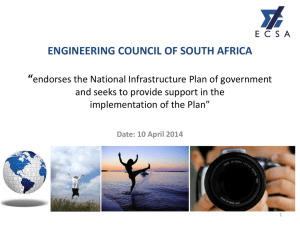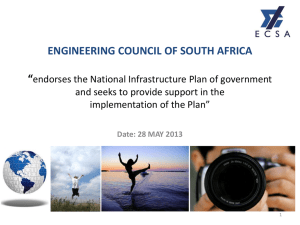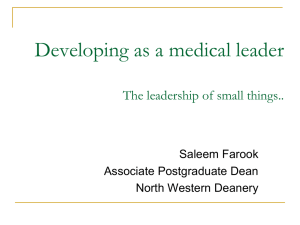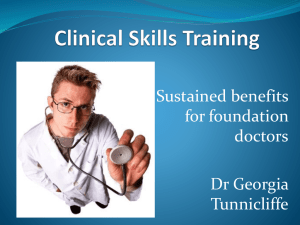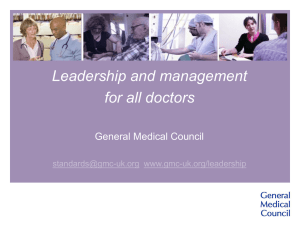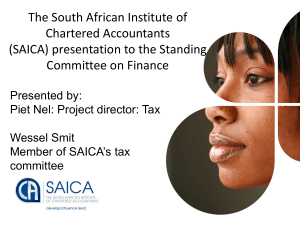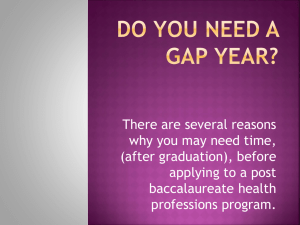Presentation
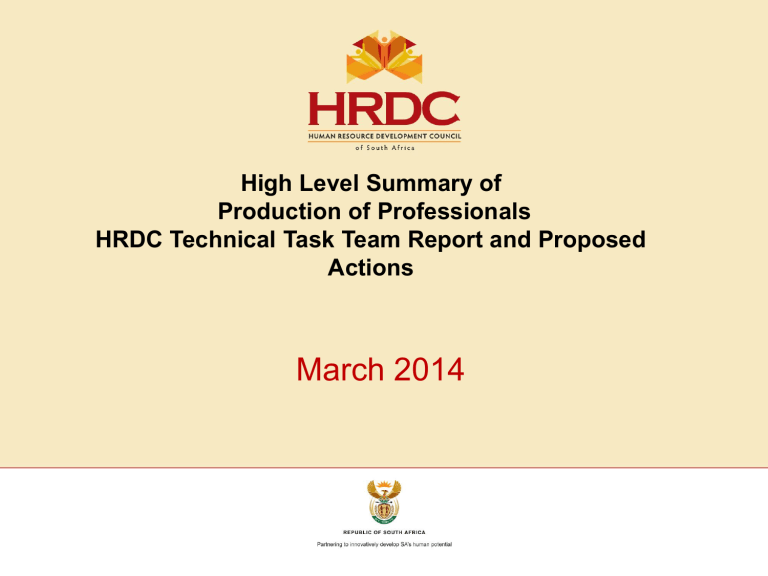
High Level Summary of
Production of Professionals
HRDC Technical Task Team Report and Proposed
Actions
March 2014
Objectives (Phase One of the Professional TTT)
• Reach agreement on fields that need to be prioritised and provide a rationale for such, guided by the NGP.
• Develop recommendations outlining practical ways in which
Council (including all its social partners) can support the production of professionals in priority fields.
• Clearly indicate what will be achieved in the short, medium and long term in the development of professionals. Flag areas of overlap with other task teams in developing the recommendations to Council and to the Technical Working Group.
Professions that formed the focus of the work of the TTT
Professions that were identified include (note that this could be expanded but was initial focus)
• Education (Teachers)
• Engineering (Professional Engineers)
• Health (Doctors, Pharmacists, Nurses)
• Financial (Chartered Accountants and Actuaries)
• Agriculture (Veterinary Doctors)
• Social (Social Workers)
See importance of these professions illustrated by the comparative analysis shown in the following slides
A snap look at the comparative data: engineers
A snap look at the comparative data: doctors
A snap look at the comparative data: nurses
A snap look at the comparative data: pharmacists
A snap look at the comparative data: veterinary doctors
A snap look at the comparative data: chartered accountants
A snap look at the comparative data: teachers
Findings: Roles and Functions
Found that there are varied roles and functions across professional bodies (regulated) which has implications for ability to grow number of professionals. Most focus on:
• Protecting the public against incompetent practitioners and unprofessional behaviour through:
– The accreditation of educational programmes;
– The registration of professionals;
– Providing advice to government on matters relating to their respective professions;
• Enforcing their respective codes of conduct and for acting against unscrupulous professionals.
But an analysis of challenges related to producing increased number of professionals highlights that professional bodies need to play additional roles to those typically in the regulations (following slides consider these challenges and implications for further areas of work)
The blockages identified at each point in the pipeline
1.
Entering education and training
– Inadequate basic education (especially mathematics and science)
– Absence of career guidance (across the board)
– In some cases limited number of spaces where learners can study an occupation (e.g. veterinary doctors and medical doctors)
2.
The blockages identified at each point in the pipeline (continued)
Sustaining learners through post-school education
(a challenge evidenced by poor throughput and completion)
– Limited preparation for tertiary education (linked to poor basic education and learning skills)
– Inconsistent quality with respect to: relevance) of curriculum (teachers), appropriateness of qualifications
(teachers and engineers), adequate infrastructure
(veterinary doctors) and lecturing staff
– Inadequate funding (and support) of students
The blockages identified at each point in the pipeline (continued)
3. Entering the world of work
– Insufficient access to practical training opportunities required to register
– Not a clear programme to enable young graduates to enter workplace or to gain relevant experience – nor is there support for graduates through this process )
– Inadequate funding of this process for many professions
(ECSA has highlighted the challenges that they are experiencing accessing funding for the candidacy phase)
The blockages identified at each point in the pipeline (continued)
– Inadequate funding of this process for many professions (ECSA has highlighted the challenges that they are experiencing accessing funding for the candidacy phase)
– In some professions, graduates are not always placed/absorbed in the workplace (social worker) or do not want to work in the public sector (nursing) or in SA (better pay elsewhere) or in the profession (better pay in other streams)
4. Career Progression and Development
– Uncertainty about requirements for CPD to remain registered
Phase One: Core Recommendations
Based on the research the following core recommendations were made:
1. Professional Councils should play a more active role in enabling individuals to enter the profession.
2. Therefore they must help to address the challenges
(blockages) identified as they relate to their profession
3. This requires that they both undertake their regulatory functions more effectively and that they undertake additional activities as required
Phase One: Core Recommendations (Cont)
4. However, it is recognised that councils have limited capacity to take on extra responsibilities (let alone in all cases fulfill current responsibilities)
5. There is a need to ensure alignment between the work of the line departments and the professional councils such that the departments provide the necessary support to councils
6. Note in some cases councils have indicated where they have financial constraints in terms of these additional requirements – it is recommended that where required additional funding is allocated to enable councils to play these roles as required.
Caveats to consider when implementing these core recommendations
• There are a host of voluntary associations that are already involved in initiatives to stimulate the supply of professional skills and there are concerns about the professional bodies attempt to replicate these activities
• There is a need to take into account the challenge of ensuring the appropriate balance between stimulating the supply of skills on the one hand and playing the regulatory role required of the statutory bodies (therefore ensuring quality of designated trade and protecting public).
Phase Two: Specific recommendations re the pipeline:
(1) Entering education and training
Professional bodies will:
– Support improved maths and science programmes (eg actuaries have launched a website to support this)
– Work with SAQA and DHET to support career guidance (eg ECSA is supporting the Engenius campaign to promote the engineering profession nationally to primary and secondary school learners, SAICA camps and business games) and recruit across provinces and from rural and urban (SAICA initiative)
– Work with DHET to support a process to increase the number of places where learners can study an occupation (veterinary doctors, doctors and certain engineering specialisation)
Phase Two: Specific recommendations re the pipeline: (1) Entering education and training (Cont)
It is proposed that government will:
– Support on-going programmes for teachers in maths and science
– Focused effort to increase the number of NSC graduates with 60% in maths and science (including focused interventions to support curriculum)
– Consider options to enable clearer signals with respect to mathematics and science (there is a need for a clear differentiation of top performers)
– Provide professional bodies, and the public, access to information about which NSC graduates have achieved more than 60% (including an analysis of race so that professional bodies are able to target more effectively and address equity imperatives)
(2) Sustaining learners through post-school education
(
Specific bursary recommendations later in presentation
)
Professional bodies will:
– Work with higher education to support the provision of relevant curriculum
(eg actuaries introduced Normative Skills into curriculum), by growing adequate teaching staff (subvention of salaries, introduction of academic articles/SAICA, Development Trust/ actuaries), appropriate qualification
( ECSA has recommended the introduction of a flexible curriculum for first degrees and diplomas in engineering, SACSSP working with the HWSETA and considering new qualifications ); and adequate infrastructure ( SAICA – particularly with HDIs, Actuaries, veterinary doctors, ECSA, Doctors,
Nurses, pharmacists)
– Assist young people with preparation for, and during, tertiary education
(including induction, tutorials, mentorship, bursaries ( SAICA – Thuthuka programme, Actuaries - mentorship, ECSA )
(2) Sustaining learners through post-school education
(Specific bursary recommendations later in presentation)
It is proposed that government will:
– DHET to work with professional councils to identify and address constraints (infrastructure, lecturers, bursaries
(including the need for professional staff and different conditions of service, etc) and prioritize and shape funding accordingly (this was highlighted across professions)
– Proposal for coordination within universities to address these professional scarce skills to avoid competing but to instead provide focused support
(3) Entering the world of work
Professional bodies will:
– Work with public and private sectors to ensure that graduates are placed and have access to relevant experience, training and mentorship
– Structured manner so clearly linked to getting registered
(SAICA learnerships and focus on accrediting workplaces as training offices ad ensuring workplaces provide opportunities,
– Actuaries – work-based skills programme and shared professional resource centre. SACSSP publish vacancies and make linkages)
(3) Entering the world of work (Cont)
It is proposed that government will:
– Review placement strategy (social workers) and conditions of service that are limiting number of professions that wish to work there (nursing (training output fine but shortage in public sector), social work (not being placed and some sectors few opportunities) and veterinary doctors (reluctant to work in public sector)
– Also need to ensure continuous access to workplace training in national, provincial and local Govt (SAICA) and supervision as well as actual work in public sector and through flow of work(highlighted by ECSA)
– Funding support to enable these graduates to move through to registration (complete candidacy phase) –Learnerships, Other options? Through SETAs, Other Options?
Bursaries
• There is a need for key players involved in bursaries to share information and be involved in a coordinative process such that there is a complementarity bursary process and that gaps are addressed (for example where learners at particular institutions are not properly funded)
• That there is the recognition that bursaries should not just address tuition but should also focus on other expenses
Bursaries (Cont)
• There is a need for bursars to provide value-added interventions such as mentoring
• Ensure that there is improved accountability (of students – to work and pass, HEI’s to improve their throughput and support learners and the employers to mentor and provide workplace experience and access to employment)
Follow the summit@
#hrdcsummit

